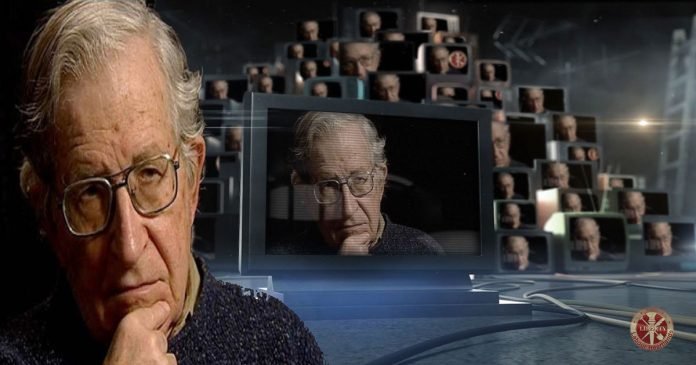Knowledge is power…
We would all do well to understand how media manipulation and control works. Chomsky offers insights and a list to learn by.
Labour Heartlands have taken the time to remaster ‘Manufacturing Consent Noam Chomsky and the Media – Feature Film’ along with listing the “Ten strategies of manipulation” by the media hoping that by understanding the manipulations and strategies used we become stronger in defeating them.
Contrary to the usual image of the press as cantankerous, obstinate, and ubiquitous in its search for truth, Edward Herman and Noam Chomsky depict how an underlying elite consensus largely structures all facets of the news.
They skillfully dissect the way in which the marketplace and the economics of publishing significantly shape the news. They reveal how issues are framed and topics chosen, and contrast the double standards underlying accounts of free elections, a free press, and governmental repression between Nicaragua and El Salvador; between the Russian invasion of Afghanistan and the American invasion of Vietnam; between the genocide in Cambodia under a pro\-American government and genocide under Pol Pot.
What emerges from this groundbreaking work is an account of just how propagandistic our mass media are, and how we can learn to read them and see their function in a radically new way.
Manufacturing Consent Noam Chomsky and the Media – Feature Film
The media paraphernalia and propaganda, have created or destroyed social movements, justified wars, tempered financial crisis, spurred on some other ideological currents and even given the phenomenon of media as producers of reality within the collective psyche. But how to detect the most common strategies for understanding these psychosocial tools in which all people participate.
Noam Chomsky – “10 strategies of manipulation” by the media
1. The strategy of distraction
The primary element of social control is the strategy of distraction which is to divert public attention from important issues and changes determined by the political and economic elites, by the technique of flood or flooding continuous distractions and insignificant information. distraction strategy is also essential to prevent the public interest in the essential knowledge in the area of the science, economics, psychology, neurobiology and cybernetics. “Maintaining public attention diverted away from the real social problems, captivated by matters of no real importance. Keep the public busy, busy, busy, no time to think, back to farm and other animals (quote from text Silent Weapons for Quiet War ).”
2. Create problems, then offer solutions
This method is also called “problem -reaction- solution. “It creates a problem, a “situation” referred to cause some reaction in the audience, so this is the principal of the steps that you want to accept. For example: let it unfold and intensify urban violence, or arrange for bloody attacks in order that the public is the applicant‟s security laws and policies to the detriment of freedom. Or: create an economic crisis to accept as a necessary evil retreat of social rights and the dismantling of public services.
3. The gradual strategy
acceptance to an unacceptable degree, just apply it gradually, dropper, for consecutive years. That is how they radically new socioeconomic conditions ( neoliberalism ) were imposed during the 1980s and 1990s: the minimal state, privatization, precariousness, flexibility, massive unemployment, wages, and do not guarantee a decent income, so many changes that have brought about a revolution if they had been applied once.
4. The strategy of deferring
Another way to accept an unpopular decision is to present it as “painful and necessary”, gaining public acceptance, at the time for future application. It is easier to accept that a future sacrifice of immediate slaughter. First, because the effort is not used immediately. Then, because the public, masses, is always the tendency to expect naively that “everything will be better tomorrow” and that the sacrifice required may be avoided. This gives the public more time to get used to the idea of change and accept it with resignation when the time comes.
5. Go to the public as a little child
Most of the advertising to the general public uses speech, argument, people and particularly children‟s intonation, often close to the weakness, as if the viewer were a little child or a mentally deficient. The harder one tries to deceive the viewer’s the more it tends to adopt a tone infantilising. Why? “If one goes to a person as if she had the age of 12 years or less, then, because of suggestion, she tends with a certain probability that a response or reaction is also devoid of a critical sense as a person 12 years or younger.
6. Use the emotional side more than the reflection
Making use of the emotional aspect is a classic technique for causing a short circuit on rational analysis, and finally to the critical sense of the individual.
Furthermore, the use of the emotional register to open the door to the unconscious for implantation or grafting ideas, desires, fears and anxieties, compulsions, or induce behaviours…
7. Keep the public in ignorance and mediocrity
Making the public incapable of understanding the technologies and methods used to control and enslavement. “The quality of education given to the lower social classes must be the poor and mediocre as possible so that the gap of ignorance it plans among the lower classes and upper classes is and remains impossible to attain for the lower classes (See „ Silent Weapons for Quiet War ).”
8. To encourage the public to be complacent with mediocrity
Promote the public to believe that the fact is fashionable to be stupid, vulgar and uneducated…
9. Self-blame Strengthen
Making the individual believe that they are the culprit of disgrace, because of their insufficient intelligence, skills or efforts. So, instead of rebelling against the economic system, the individual feels devalues and blames themselves, which in turn creates a depressive state, one of whose effects is the inhibition of their action. And without action, there is no revolution!
10. Getting to know the individuals better than they know themselves
Over the past 50 years, advances of accelerated science has generated a growing gap between public knowledge and those owned and operated by dominant elites.
Thanks to biology, neurobiology and applied psychology, the “system” has enjoyed a sophisticated understanding of human beings, both physically and psychologically.
The system has gotten better acquainted with the common man more than he knows himself. This means that, in most cases, the system exerts greater control and great power over individuals, greater than that of individuals about themselves.
The book Manufacturing Consent: The Political Economy of the Mass Media is extremely interesting and available from most outlets. The Kindel version is available here.
Support Independent Journalism Today
Our unwavering dedication is to provide you with unbiased news, diverse perspectives, and insightful opinions. We're on a mission to ensure that those in positions of power are held accountable for their actions, but we can't do it alone. Labour Heartlands is primarily funded by me, Paul Knaggs, and by the generous contributions of readers like you. Your donations keep us going and help us uphold the principles of independent journalism. Join us in our quest for truth, transparency, and accountability – donate today and be a part of our mission!
Like everyone else, we're facing challenges, and we need your help to stay online and continue providing crucial journalism. Every contribution, no matter how small, goes a long way in helping us thrive. By becoming one of our donors, you become a vital part of our mission to uncover the truth and uphold the values of democracy.
While we maintain our independence from political affiliations, we stand united against corruption, injustice, and the erosion of free speech, truth, and democracy. We believe in the power of accurate information in a democracy, and we consider facts non-negotiable.
Your support, no matter the amount, can make a significant impact. Together, we can make a difference and continue our journey toward a more informed and just society.
Thank you for supporting Labour Heartlands












